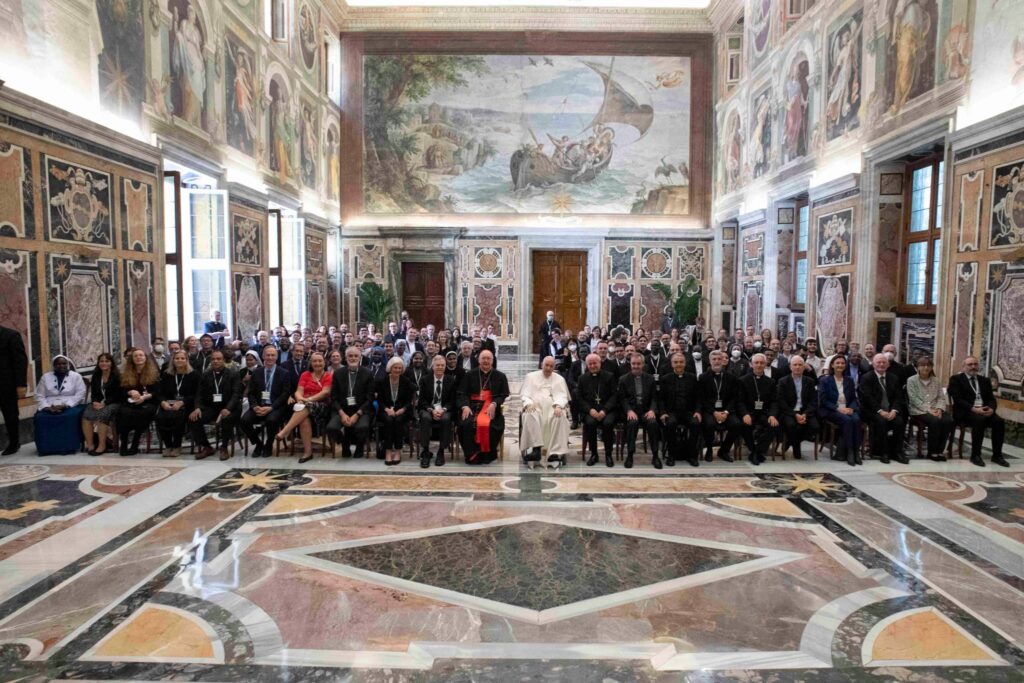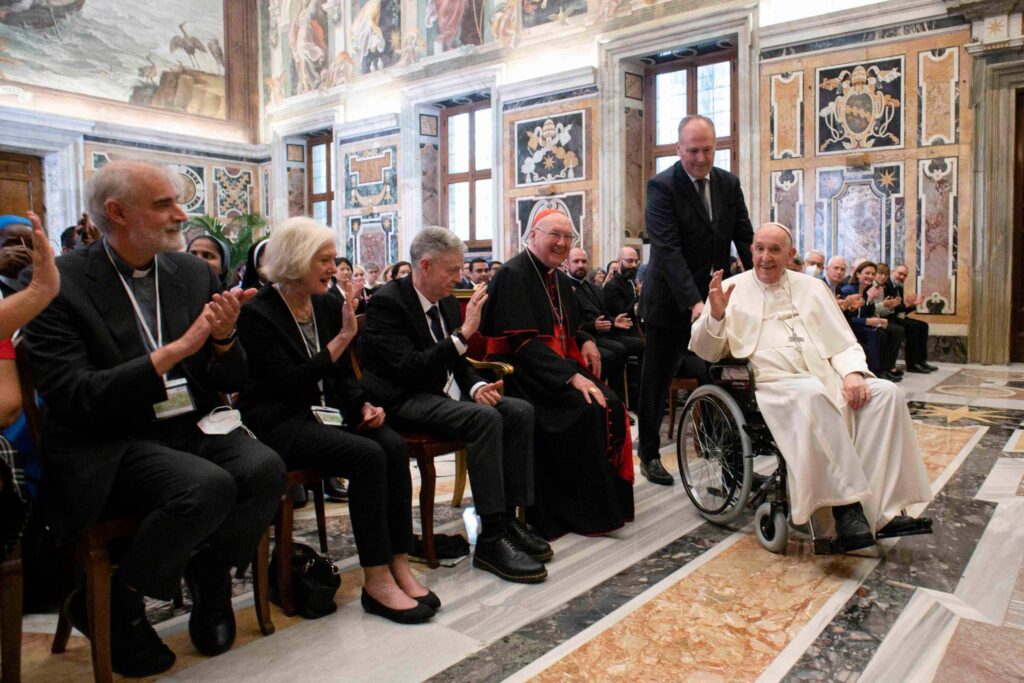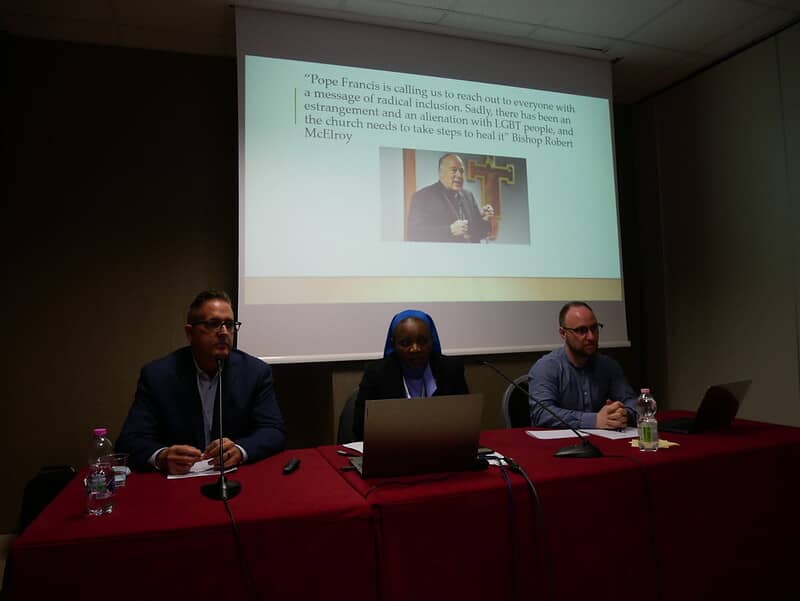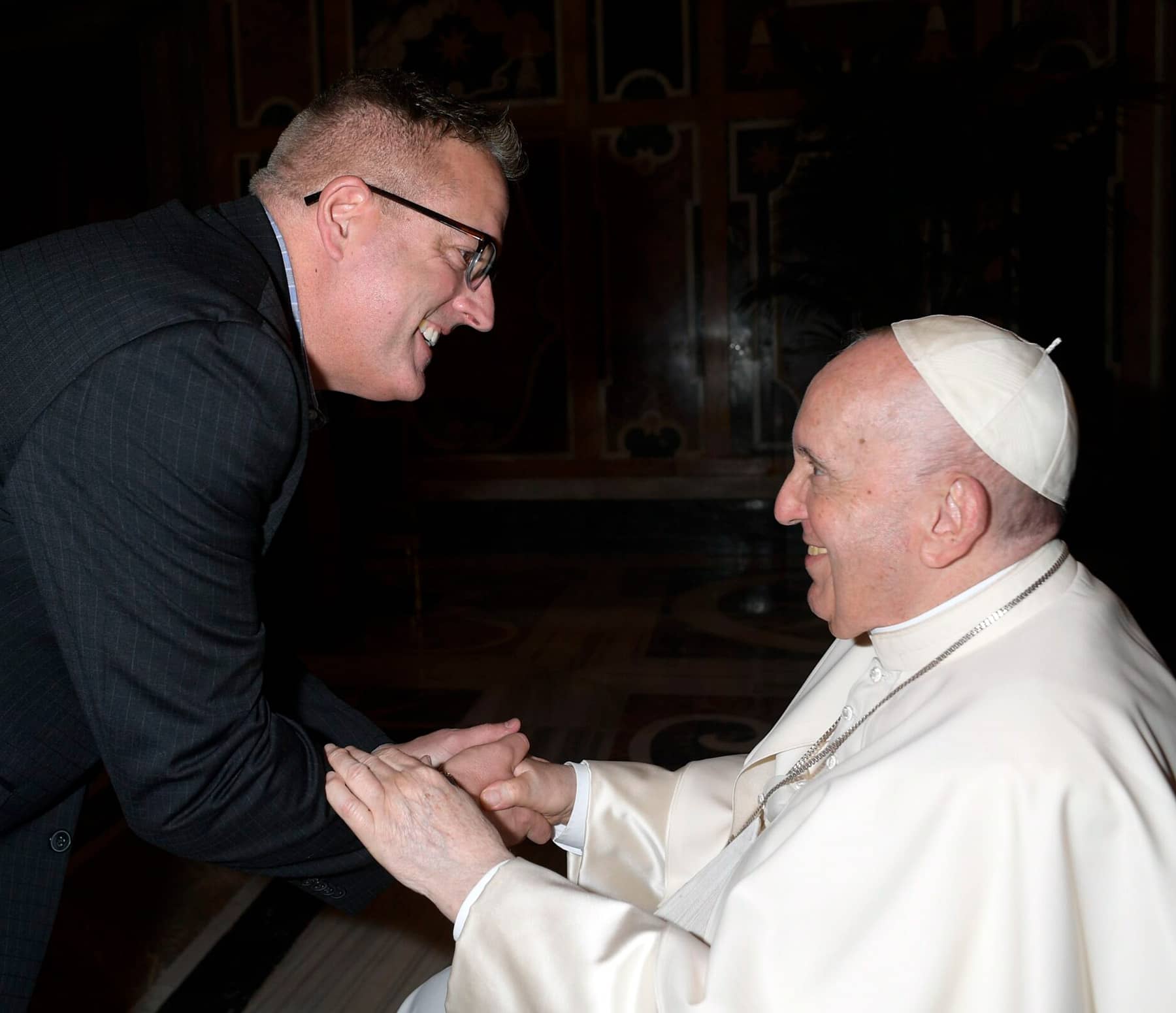Editor’s Note: In 2018, Aaron Bianco, a professor of theology at the University of San Diego, was hounded from his job as a pastoral associate at St. John the Evangelist Church in the Diocese of San Diego after it was discovered that he was gay.
As the San Diego Union Tribune reported, someone broke into St. John’s and painted a homophobic slur on the wall; Aaron’s tires were slashed and angry notes left on his car. At one point, the front doors of the church were set on fire. Aaron also received death threats and one parishioner waited after Mass to punch him. Eventually, the FBI was called and asked him a question: Is this job worth dying for? Despite the support of his local bishop, Robert W. McElroy, Aaron resigned.
This month, in a remarkable turnabout, Aaron was invited to speak at a prestigious academic conference on Pope Francis’s apostolic letter on the family, Amoris Laetitia (“The Joy of Love”), organized by the Dicastery for Laity, Family and Life and the Pontifical Gregorian University in Rome. His topic was Amoris Laetitia and LGBT people. Outreach has published his full remarks below.
My name is Aaron Bianco. I am a gay Catholic man who has been in a committed relationship for 17 years. My experiences reflect the deep pain, confusion and joy of many LGBT Catholics. These experiences have led me to a deep love for the Church but also a realistic view of the magisterium and sometimes their unrealistic views of love and sexual morality. To the LGBT Catholic, this can often lead to dismay and confusion. Amoris Laetitia had the perfect opportunity to put all confusion aside and be absolute in its view of LGBT relationships, to make the distinction of sacramental marriage and those in civil unions and to find a way to bless the love present in these civil marriages. As Scripture tells us, where there is love, there is God. (1 Jn 4:16)
Let that be the starting point for a true dialogue. As many moral theologians and some in the hierarchy have expressed, the committed love between same-sex individuals must be valued even if it does not hold up to the complete ideal of church teaching. As Cardinal Christoph Schönborn of Vienna states, “Personally, I find it touching that at a time when marriage is losing its radiance, couples who feel and live homosexuality want that ultimate form of partnership.”
In Amoris Laetitia, Pope Francis opens the door to working with everyone, including the LGBT community. In chapter eight Francis states, “It can no longer simply be said that all those in “irregular” situations are living in a state of moral sin and are deprived of sanctifying grace.” This quote is a wonderful first step. But in reality, those in the LGBT community believe that God has made them they way they are. In their hearts and consciences, they do not believe they are in a state of “irregularity.” They are trying to live out their authentic self as part of the Body of Christ, and to do that they must feel welcomed by the larger community.

“As many moral theologians and some in the hierarchy have expressed, the committed love between same-sex individuals must be valued even if it does not hold up to the complete ideal of church teaching.”
Aaron Bianco
In this presentation, I will bring you four stories of LGBT Catholics in the United States who also experience their own joys and struggles. To make it very clear, these are individuals who have decided to remain within the church. There are thousands of stories of those who did not feel welcome and have left the church forever.
These stories are real situations that I have encountered working in parish and university life as it pertains to LGBT people.
No member of the Body of Christ should feel in exile
The first story I bring to you is John DelMistro. John is a 76-year-old man from southern California. John grew up going to Catholic school and attending Mass with his family. At 18, John confided in his priest that he was gay. The priest told him, “You need to repent and squash that part of you or you will go to hell.” That was the last time John was in a Catholic Church until I met him at a Mass the Diocese of San Diego had to welcome the LGBT community.
For 58 years, John did not feel that he would be welcomed in the community he was baptized into. Pope Francis in AL (Amoris Laetitia) states, “It is a matter of reaching out to everyone, of needing to help each person find his or her proper way of participating in the ecclesial community and thus to experience being touched by an unmerited, unconditional and gratuitous mercy. No one can be condemned for ever, because that is not the logic of the Gospel.” Francis continues, “Here I am not speaking only of the divorced and remarried but of everyone, in whatever situation they find themselves.”
John believed he was condemned forever. It was the outreach of Bishop Robert McElroy and the Diocese of San Diego to the LGBT community that brought John back home. He stood weeping, telling me his story after he attended the Mass. John told me even though he didn’t feel welcomed in the church for all those years he believed in his heart he was always Catholic.
No member of the Body should feel they are in exile from the community of God’s love as a result of their expression of love. When we look at John, we find a man that was in a relationship with his partner for 35 years. They owned their own home, owned a printing shop; they also raised a niece after John’s sister was killed. Through all their pain, John and his partner decided to send their niece to Catholic schools even though they did not feel welcomed. Today, this niece is a vowed religious with the Sisters of Mercy. Can we as a Church not find a way to bless this family? Many of us were hoping AL would have made that possible.

A Visible Sign of God’s Unconditional Love
The second story I want to share with you is a student at the University of San Diego, a Roman Catholic institution. Cameron is a sophomore and is 20 years old. Cameron comes from a low-income, multi-racial family. Cameron was raised Catholic and attended Catholic schools throughout his education. I encountered Cameron in his first semester at USD; he was in my “Studies in Catholic Theology” class. Cameron would often come to my office after class to talk. He would discuss university life, his family, grades. Until one day, he came in shut the door and burst out in tears.
“LGBT Catholics are trying to live out their authentic self as part of the Body of Christ, and to do that they must feel welcomed by the larger community.”
Aaron Bianco
He said “I have something I need to say, and I want to know that you won’t think differently of me.” I assured him I wouldn’t and for the first time Cameron uttered the words, “I’m gay.” For Cameron, growing up in a toxic, masculine, religious family meant that he believed he would have to live a lie his whole life. When Cameron was 14, his father asked their parish priest to talk to Cameron about the sin of homosexuality. Cameron told me he was so upset; he had not even come to the realization to himself that he was gay. He wondered why his dad had done this and why did the priest go along with it.
The next four years of high school were made up of lie after lie all to hide his sexuality. He told me that many times he would lay in bed and dream about killing himself.
One October, Cameron took pills in his attempt to end his life. Thankfully, his mother came home and got him help. But that did not stop the pain Cameron lived with. Is this what we considered an ideal family according to the Church? Is the unique value of everyone not a part of the call to sanctifying love in a family? Cameron did not experience this. Cameron graduated high school and came to the University of San Diego as an attempt to get away from family. He felt maybe he could finally be free of his lies.
I asked Cameron, “Why did you feel comfortable telling me you are gay?” And he said, “You always talk about God’s unconditional love, and you quoted Pope Francis speaking of difficulties.” The quote Cameron was speaking of is AL 306: “In every situation, when dealing with those who have difficulties in living God’s law to the full, the invitation to pursue the via caritas must be clearly heard. Fraternal charity is the first law of Christians.”
Cameron is now part of a small faith sharing group for LGBT students at USD. He attends Mass at the university chapel and finally feels welcomed in the Church. Cameron’s story ends on a happy note, but we still live in a time that religious LGBT young adults are more than four times as likely to attempt suicide than their peers.
We as a church community must be on the forefront of being a visible sign of God’s unconditional love. Many young people today are looking for a spiritual home, but they are also not going to accept a community that is not welcoming. On many Catholic university campuses in the U.S. today, LGBT ministry has become an integral part of the mission and Catholic identity.
“We as a church community must be on the forefront of being a visible sign of God’s unconditional love.”
Aaron Bianco
So, why is it, even on these campuses, LGBT youth still feel afraid to come out? I venture to say its because of the mixed messages that come from the magisterium. One message of welcome and another message of “irregular.” My college students are reading AL and asking me questions like “Why is Pope Francis so ambiguous?” “Why doesn’t he just say what he really thinks?”
This is the problem with the hierarchy: mixed messages flow abundantly. Many of my students both straight and LGBT want the Church to speak out against all injustices including those perpetrated against the LGBT community.

Is anyone “irregular”?
The third story is about a woman named Joan. Joan is 56 and is transgender. She has lived as a woman for thirty-one years. Joan comes from a Filipino family that migrated to the U.S. approximately 40 years ago. I first met Joan at St. John’s Parish. This was the parish for which Bishop McElroy of San Diego asked me to start an LGBT ministry.
Joan came to my office one day and asked to speak with me. She then began to tell her story. She told me how she was active in her parish, was part of the Cursillo movement, and led the ministry to feed the homeless. She was a hairdresser and engaged in community events. Joan had decided long ago to remain single as her own personal choice. She said she had family and many friends in the transgender community that gave her all the love she needed. She told me the only problem was she has hidden that she is transgender to her parish community. She feared her pastor would remove her from all her ministries at the parish and maybe ask her not to attend anymore.
In AL 305, Francis states, “For this reason, a pastor cannot feel that it is enough simple to apply moral laws to those living in ‘irregular’ situations, as if they were stones to throw at people’s lives. This would bespeak the closed heart of one used to hiding behind the church’s teaching.” When it comes to welcoming the LGBT community, this is exactly what is happening: pastors hiding behind the law and not listening to the lived life experiences of these individuals.
Francis’s message is a good first step, but many pastors have decided to be the judge of all situations, and it is causing people like Joan to leave the church. As the Body of Christ, is it not our responsibility to lead all people to the saving message of the gospel?
Today, Joan is an active member at St. John’s. She participates in the LGBT ministry; she is an Extraordinary Minster of the Eucharist, and twice a week, she delivers meals to a shelter for women in crisis pregnancies.
This is not the reality of most transgender Catholics. Most are living in the shadows and are not being welcomed by their church communities. In AL chapter eight, we hear often of “irregular” situations. The word “irregular” indicates not being of the norm. How can we truly welcome people and use words that are hurtful and damaging? AL had the opportunity to be more sensitive to those who already don’t feel they are welcomed by the Church.
Words like “irregular” could have been changed to be more sensitive to those in situations that don’t live up to the ideal of Church teaching.
Back to the Table
My final story is a women named Kathy. Kathy is civilly married to her wife Victoria. They have been married for 10 years and both are in higher education in San Diego.
I met Kathy when a mutual colleague at the University of San Diego introduced us. Kathy and Victoria are both Catholic. Being part of the church community is very important to both. But for years they didn’t think it was possible to join their parish. Their fear was: If they attended a parish together, would they be welcomed or shunned? At times, they thought about going separately to Mass. That way the pastor or community wouldn’t know.
They decided this did not sit well with their conscience and they couldn’t deny who they are. That led them to watch Mass on television instead of going in person. This went on for 10 years. Kathy told me how she missed receiving the Eucharist, that she longed to be able to receive the Eucharist again.
“If we as Catholics believe that the Eucharist is the pinnacle of God’s love and dwelling within us, should we not find ways to bring all those in “irregular” situations back to the table of the Lord?”
Aaron Bianco
Kathy believes because she is living in an “irregular” marriage she could not receive the Eucharist. In AL 308, Pope Francis states: “But I sincerely believe that Jesus wants a Church attentive to the goodness which the Holy Spirit sows in the midst of human weakness, a Mother who, while clearly expressing her objective teaching ‘always does what good she can, even if in the process her shoes get soiled by the mud of the streets.’ There are many who claim the Eucharist must be protected and administered to only those who are “worthy.”
If we as Catholics believe that the Eucharist is the pinnacle of God’s love and dwelling within us, should we not find ways to bring all those in “irregular” situations back to the table of the Lord? In AL, Francis does not go far enough to address this situation. It’s a situation that the Church must address and find a way to welcome these individuals back to the table. As St. Thomas Aquinas states, “Because of the diverse conditions of humans, it happens that some acts are virtuous to some people, as appropriate and suitable to them, while the same acts are immoral for others, as inappropriate to them.” Let this be a start to the conversation.
Kathy should feel as welcomed in her Church community as anyone else. She should be free to live out her call to full communion, not as a second-class citizen who worries what is appropriate for her and what is not.
We have heard during the synod that conversations took place on ways to bring those in “irregular” situations back to the table. We also heard there was a stiff rebuke to any changes revolving around the Eucharist. That conversation must take place and those in the relationships must be part of the conversation. The conversation can not only be the hierarchy and vowed religious. I look forward to when those living the reality are asked to lend their voice.
Mercy is the Criterion
With AL, Francis begins the conversation, but the conversation must not stop there. Many, including LGBT people, feel they do not know where they fit in to the church community. They hear from Francis wonderful words of hope. For example, “I accompanied people with homosexual tendencies and even homosexual activity. I accompanied them; I helped them draw closer to the Lord, although some couldn’t, I never abandoned them.”
Francis continues, “People must be accompanied like Jesus would accompany them, When a person who has this situation arrives before Jesus, Jesus certainly will not say, ‘Go away because you are homosexual.'” And on the other hand, we hear from some in the hierarchy, like Bishop Joseph Strickland of the Diocese of Taylor in Texas state that LGBTQ persons “whether actively living out the homosexual lifestyle or not, are not worthy at the table of the Lord.”
In AL, Pope Francis had the opportunity to move us past a church of judgment and letter of the law. That is not what happened. The document was a good first step; it brought up subjects the church has for too long not discussed. For us ministering to the LGBT community in the United States, we need to hear from Pope Francis concise words of welcome and complete acceptance. We are at a crossroads as a church and ambiguity is not what the faithful need.
The church hierarchy must take what we have learned from AL and produce a document that calls all of God’s children to full participation in the church. I will end with a final quote from Francis in AL: “We cannot forget that ‘mercy is not only the working of the Father; it becomes a criterion for knowing who his true children are. In a word, we are called to show mercy because mercy was first shown to us.'”
This is not sheer romanticism or a lukewarm response to God’s love, which always seeks what is best for us, for mercy is the very foundation of the church’s life. All her pastoral activity should be caught up in the tenderness which she shows to her believer; nothing in her preaching and her witness to the world can be lacking in mercy. It is true, at times, we act as arbitrators of grace rather than its facilitators. But, as Evangelii Gaudium states, “the Church is not a tollhouse; it is the house of the Father, where there is a place for everyone, with all their problems.”



